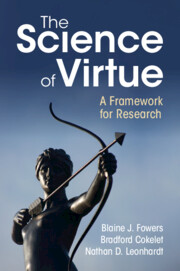Book contents
- The Science of Virtue
- The Science of Virtue
- Copyright page
- Contents
- Acknowledgments
- Introduction
- Part I Philosophical Resources and Prospects
- Part II Psychological Resources and Prospects
- Part III Organizing Virtue Research with the STRIVE-4 Model
- Chapter 7 Virtues as Scalar Traits
- Chapter 8 The Role Sensitivity of Virtues
- Chapter 9 Virtue Trait by Situation Interactions
- Chapter 10 Values and Eudaimonia as Guideposts for Virtues
- Chapter 11 The Four Components of Virtue
- Part IV The Science and Practice of Virtue
- References
- Index
Chapter 7 - Virtues as Scalar Traits
from Part III - Organizing Virtue Research with the STRIVE-4 Model
Published online by Cambridge University Press: 11 January 2024
- The Science of Virtue
- The Science of Virtue
- Copyright page
- Contents
- Acknowledgments
- Introduction
- Part I Philosophical Resources and Prospects
- Part II Psychological Resources and Prospects
- Part III Organizing Virtue Research with the STRIVE-4 Model
- Chapter 7 Virtues as Scalar Traits
- Chapter 8 The Role Sensitivity of Virtues
- Chapter 9 Virtue Trait by Situation Interactions
- Chapter 10 Values and Eudaimonia as Guideposts for Virtues
- Chapter 11 The Four Components of Virtue
- Part IV The Science and Practice of Virtue
- References
- Index
Summary
This chapter begins an in-depth discussion of the proposed STRIVE-4 Model. It focuses on the S (scalar) and T (trait) of the model. To demonstrate that virtues can be captured in a scalar manner, It highlights studies that support the reliability and validity of constructs. Virtues such as courage, gratitude, and compassion have all been established as scalar constructs and have been related to a variety of expected well-being outcomes. The chapter further highlights empirical evidence showing that virtues cannot be subsumed by personality research or social desirability, and that informant reports further confirm researchers’ ability to capture scalar virtues. To highlight empirical work on virtues as traits, it discusses the value of intensive longitudinal studies. These studies demonstrate between-person variability and within-person consistency to support the hypothesis that virtues are traits. Finally, the chapter closes by discussing some challenges of virtue assessment, including Aristotle’s assertion of the golden mean and how to understand vice traits. Altogether, the evidence favors assessing virtues as scalar traits. It suggests it is time for researchers to advance virtue science with more sophisticated methods.
Information
- Type
- Chapter
- Information
- The Science of VirtueA Framework for Research, pp. 177 - 201Publisher: Cambridge University PressPrint publication year: 2024
